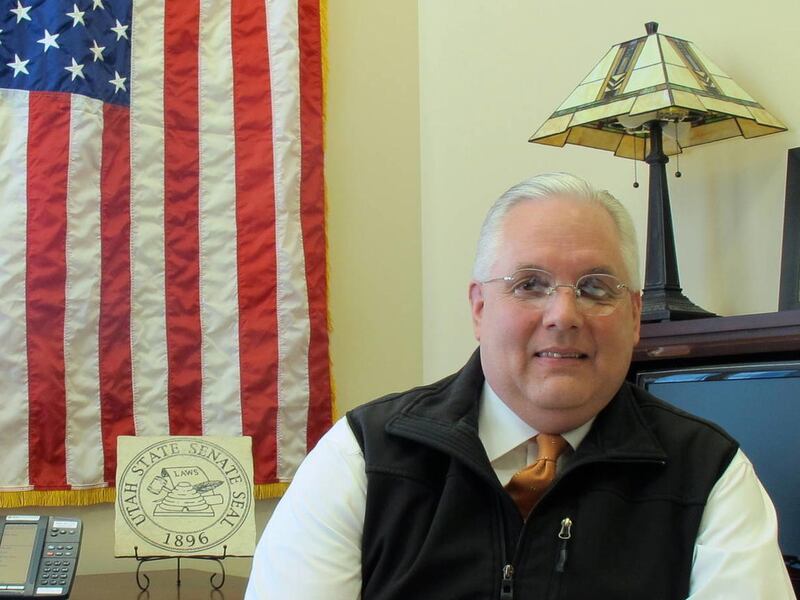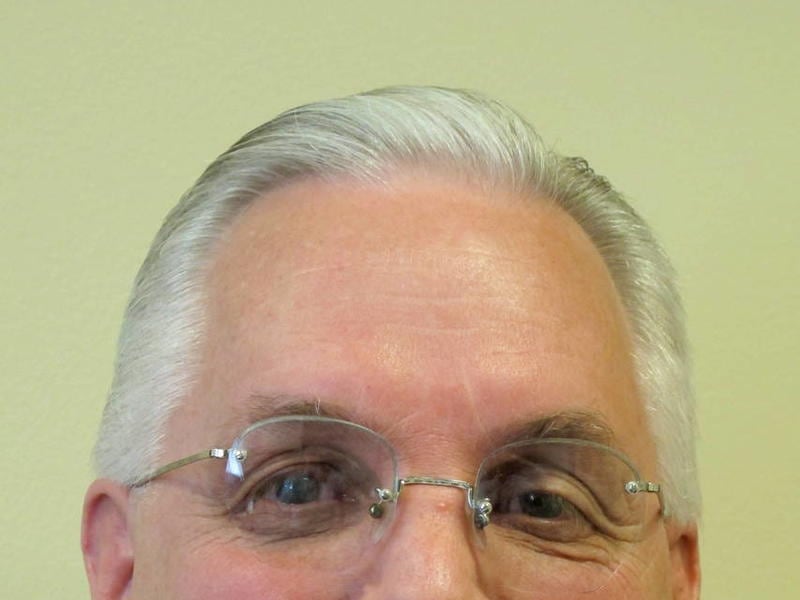SALT LAKE CITY — To say state Sen. Stuart Reid understands both sides of the aisle is a massive understatement.
Not only does he understand them, he’s walked them.
First as a Democrat, he spent decades as a member of the Democratic Party, sitting on the party’s state executive committee as well as serving as a Democrat on the Salt Lake City Council.
Second as a Republican, the party he switched to four years ago before being elected to the state Senate in District 18, representing parts of Weber, Davis and Morgan counties.
When he was elected to the Senate, the 57-year-old Reid, who has also been a U.S. Army chaplain; a lobbyist for the LDS Church; and, on separate occasions, economic development director to Salt Lake City Mayor Deedee Corradini (a Democrat) and Ogden Mayor Matthew Godfrey (a Republican), vowed he would serve just one four-year term. That term ends in early January 2015.
After the recent adjournment of the 2014 legislative session, the Deseret News sat down with the trans-party senator from Ogden to get his views on a variety of subjects.
DN: Thank you for taking the time to talk with us. So you meant it when you said you would serve just one term?
SR: That’s right. I’ll be done in January.
DN: Any particular reason why?
SR: I’ve been around government doing public service now, including military service, elected and appointed positions, for nearly 30 years. I feel like I’ve done my part and it’s time to let other people have opportunities. I’m looking forward to seek more opportunity for harmony in my life rather than the constant battling. Politics is certainly not for the faint of heart, and you have to have a thick skin because eventually you alienate just about everybody if you take positions of any kind that are controversial. But that’s not why I’m leaving. I’ve been at it a long time, and I think most people in elected office should come and go.
DN: You were a Democrat before you were a Republican, but you’ve said your political views have never changed. Please elaborate.
SR: I was a Democratic up until four years ago. I’d run for the Senate as a Democrat and lost by 400 votes. Then I switched and ran as a Republican in the same district and got 60 percent of the vote. I won by thousands of votes. My politics didn’t change at all. Whether as a Democrat or Republican I’ve always been conservative on fiscal issues and moderate on moral social issues.
DN: Your story suggests it isn’t easy wearing the Democrat label in Utah. Why do you think that’s the case?
SR: I think the problem for Utah Democrats has been and continues to be the national platform. The Democratic Party and the Republican Party were fairly equally yoked in Utah back in the '40s, '50s and '60s, and then the decline of the Democratic Party took place with Roe v. Wade and the sexual revolution of the '60s. People in the state who would normally be Democrats have turned to the Republican Party because it more closely represents their values and the culture that has been established here, primarily by the LDS Church. I think it’s a unique thing about Utah. It’s interesting because you’ll have Republicans who care about minority issues, they care about the poor, but because of the moral social issues that the Democratic Party has supported they just can’t be Democrats. As a Utah Democrat, I spent most of my time, 29-some years, trying to reform the party when it came to these moral social issues, but it just wouldn’t budge. The smaller the party’s become, the more the extreme elements are controlling the party so it’s very hopeless now, particularly with the passage of SB54, the Count My Vote issue.
DN: How does SB54 contribute to the imbalance?
SR: Because now, due to SB54, a lot of Democrats who couldn’t have gotten through a convention process to be nominated can bypass the convention and become what I call signature-gathering Republicans. They’ll move out of the Democratic Party and get elected as Republicans, just as happened with me. I think you’ll see more and more of that. So it will be the death of the Democratic Party if it wasn’t already dead in Utah.
DN: Why will a larger Republican Party be a bad thing?
SR: I think it will be quite disruptive in the Legislature because you’ll have a divided caucus. Now you’ll have two factions in the Republican Party. You’ll have the caucus-convention faction and the signature-gathering faction, and they will essentially make up the two parties in the state of Utah. The signature-gatherers will be more moderate to liberal and the caucus faction much more conservative. The Democrats who are left will decide a lot of how the votes will go because theirs will be the determining votes on the major issues. I didn’t vote for SB54 because I believe it will be the liberalization of the Legislature, which some people think is a good thing. I don’t.
DN: In the past two legislative sessions you have adamantly opposed antidiscrimination laws for the LGBT community. Please explain your stand.
SR: Utah is at a crossroads. For the first time in our history the Legislature has supported extending special protections for something that has previously been held to be immoral. Historically, when something is held to be immoral we do one of three things: We ignore it. A lot of things going on are immoral that we just don’t think about. We sanction it but don’t enforce it, adultery for example, or we punish it, like prostitution. We’ve always done one of those three things. What we have never done before was to extend special protection and rights to something we think is immoral. So the big question for society: Is homosexual behavior still considered immoral?
DN: And if the answer is no?
SR: Then there will inevitably be a confrontation between the rights extended to the LGBT community and religious rights. Part of the problem, and what people don’t fully understand, is you have religious freedom that is in the constitution, it’s the first freedom, and for the LGBT community to receive fundamental rights on the same level as these religious rights is impossible. These two sets of rights can’t coexist. If the LGBT community receives fundamental rights then religion has to give up some of its rights. It’s unavoidable. That’s the discussion that is underway and that’s where the tension is.
DN: Any predictions what will happen?
SR: Going forward, this will be one of those issues that is going to shape our country in a dramatic way. I think a lot of it is the baby boomer generation not wanting to make the mistakes of the civil rights era in the '50s and '60s and they view this fight being the same. I argue that it’s not the same in any way, shape or form. We fought a civil war over rights for blacks. We passed three amendments extending fundamental rights to them. Now we have just the opposite. We have judges trying to be activists saying one of those amendments, the 14th Amendment, applies to the LGBT community when in fact there’s no justification for that. If you want fundamental rights for the LGBT community you have to go to the Constitution as well. They don’t want to do that. They want to get the courts to reinterpret the Constitution so that the 14th Amendment applies to them. I actually anticipate that in the end the nation and the courts will decide that the LGBT community will get the protections it’s seeking and that religious freedom will have to give way. I’ve tried to play a role in delaying it.
DN: What will you miss most after you leave the political arena?
SR: I’ll miss the collegiality of the Legislature, particularly the Senate. It’s a wonderful experience to see people that differ on many, many issues be so collegial, have friendships, even frankly close friendships. I think if you were to talk to (Utah Democratic Chairman) Jim Dabakis for example, when he came to the Senate he thought it was going to be a rough ride for him. People embraced him, including me, and he’s embraced others and he referred to the Senate as “Senate family” the other day. I’ll miss that most of all. I think far and away the people serving in the senate are good and honest people trying to make a difference.
DN: What do you view as your most important contribution?
SR: Over three sessions I’ve passed a number of bills that have set up a new infrastructure and will create a new model to try to help the 52,000 children in the state of Utah that are part of the intergenerational poverty and welfare dependency cycle. These children have higher school dropout rates, higher rates of alcohol use, higher rates of crime, higher rates of teen pregnancy, higher rates of suicide. When they’re in the cycle it’s very, very difficult for them to improve their lives and then it gets passed on to the next generation. Setting up an infrastructure and framing a model for intervening in their lives I think is the most important thing I’ve done while I’ve been in the Legislature.
Email: benson@deseretnews.com



